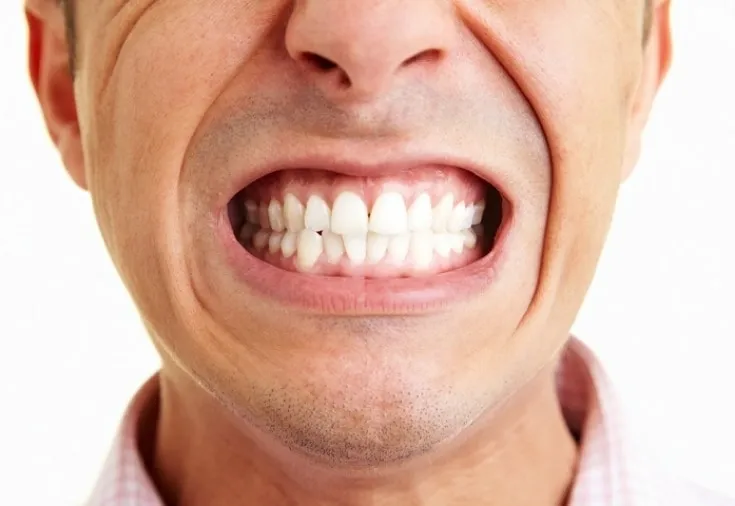Teeth grinding is a common problem that many people face, which can significantly affect overall health and quality of life, as this condition is not visible to the eye, and is characterized by the gradual erosion of tooth surfaces, which may lead to serious health complications. In this article, we will comprehensively explore the world of this problem, from the signs and symptoms that indicate its presence, to its possible causes, to the best ways to deal with it and treat it, so read on to discover everything you need to know about this common problem and how to overcome it.
What is teeth grinding?
bruxism is a common phenomenon and may have several possible causes, including psychological stress and tension, jaw tension, bite abnormalities, and some chronic diseases such as sleep disturbance. A person suffering from this condition may not be aware of it until the doctor shows signs of its presence, such as excessive wear on the surface of the teeth, complaints of pain in the jaws, or headaches in the morning.
Causes of bruxism
- Stress, psychological stress, and anxiety are the most common causes.
- Malocclusion, which is when the teeth do not meet properly when the jaw is closed.
- Teething in children.
- Suffering from neurological disorders, such as Parkinson’s disease, Huntington’s disease, epilepsy, and dementia.
- Autism spectrum disorder (autism).
- Suffering from some diseases, such as gastroesophageal reflux disease.
- Sleep apnea.
- Use of certain medications, such as some types of antidepressants, antipsychotics, and stimulants.
- Eat lots of foods and drinks rich in caffeine.
- Smoking, drinking alcohol, or using drugs.
Symptoms of teeth grinding
- Disturbing noises during sleep: The person himself or his sleeping partner may notice the sound of gnashing or grinding teeth during sleep.
- Pain in the jaws: Teeth grinding can be accompanied by pain in the jaws, especially in the morning upon waking up.
- Tooth surface erosion: Teeth grinding can erode the outer layer of teeth (enamel), increasing the risk of tooth decay and tooth decay.
- Tooth sensitivity: Teeth grinding can increase tooth sensitivity to heat, cold, and pressure.
- Head and face pain: You may feel pain in the head and face as a result of muscle tension resulting from teeth grinding.
- Swollen jaws: In some cases, the jaws may swell as a result of the constant stress and pressure caused by teeth grinding.
- Gum recession: Teeth grinding may cause the gums to get stuck between the teeth, causing puffiness and swelling in some cases.
- Muscle pain in the neck and shoulders: Pain in the muscles surrounding the jaws, neck, and shoulders may occur as a result of excess tension resulting from teeth grinding.
Read also: The latest methods of dental implants in Turkey
Treatment of bruxism
Mild cases of bruxism may not require treatment, but if annoying symptoms appear or negatively affect dental health, you must undergo dental treatment. Treatments include identifying and treating the underlying cause of this condition, such as psychological therapy to treat depression and anxiety and reduce psychological stress, in addition to wearing a night guard to protect the teeth and relieve pressure on them. Treatment also includes the use of some medications prescribed by the doctor, such as muscle relaxants and pain relievers, in addition to applying warm compresses to the cheek to relax the jaw muscles, to alleviate the symptoms of bruxism, Botox can also be injected to relieve teeth grinding during sleep.
Read also: How to get a Hollywood smile
How can bruxism be prevented?
- Reducing stress: As stress is a major factor in causing teeth grinding, relaxation and practicing deep breathing techniques and yoga may help reduce stress.
- Wear a dental guard: A night guard, which is shaped by the dentist to the individual’s size, can be used to protect the teeth from wear and tear as a result of grinding during sleep.
- Reducing stimulant consumption: Some show that consuming stimulants such as caffeine may increase the likelihood of teeth grinding, so reducing the amount of stimulants consumed may be considered.
- Maintaining overall oral health: By maintaining regular dental hygiene and visiting the dentist for regular check-ups, the chances of squeaking can be reduced.
- Avoid alcohol and smoking: Drinking alcohol and smoking can increase muscle tension and thus increase the possibility of teeth grinding.
Related articles :
Hollywood smile in Istanbul
advantages of cosmetic dentistry in Turkey
Plastic surgery in Istanbul
Dental treatment cost in Turkey
advantages of laser teeth whitening in Istanbul
Types and risks of dental implants in Turkey
hair transplant techniques in Istanbul
Dental veneers in Turkey
Hair transplantation in Turkey
Types of orthodontics in Istanbul and their features
